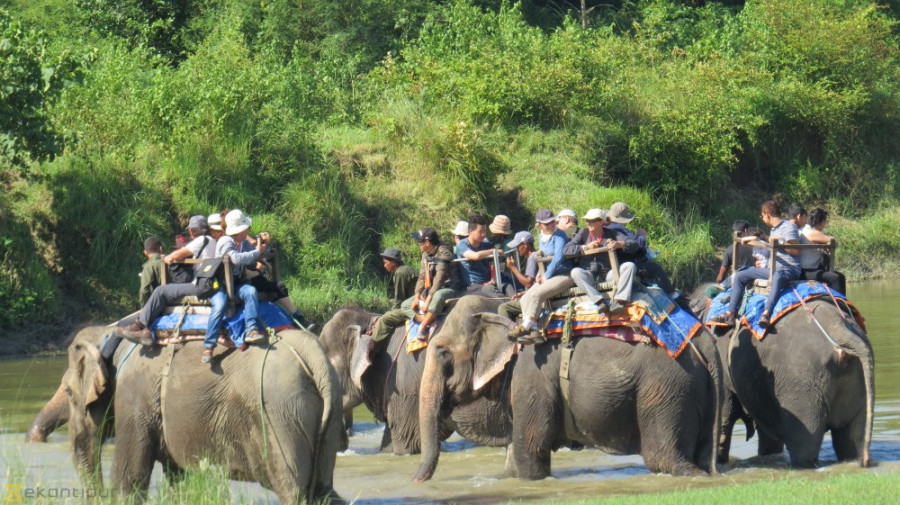Climate & Environment
The elephant in the room
Many in Sauraha are selling their elephants meant for safaris to Indian buyers due to Covid-19-fuelled crisis. Now there are legal issues that no one talked about before.
Chandan Kumar Mandal
Nearly four years ago, a tourism entrepreneur from Sauraha in Chitwan, bought an elephant to offer elephant safari to visitors. Elephant safari is one of the major tourist activities in Sauraha—one of the major hubs for wildlife tourism in the country.
This week, the entrepreneur, who also owns a hotel in the town, decided to sell his female elephant. The owner, who did not want his identity revealed, sold the elephant, about 45-50 years old, to an Indian buyer.
He is one of the many elephant owners in Sauraha who have been selling their elephants of late, attracting quite some attention and a fair share of criticism.
After the Covid-19 pandemic hit tourism hard, these elephant owners were at their wit’s end–the income had come down to zero but their expenses remained the same.
An elephant’s upkeep is an expensive affair, said the entrepreneur. Now he does not have any qualms about selling his elephant which used to give him business until the pandemic hit.
“When I had an elephant, there were concerns from animal rights activists that we didn’t feed and treat the animal well. A lot of drama was happening all these years,” the owner told the Post over the phone from Sauraha. “We were not allowed to let even four persons ride the elephant. Nor were we allowed to make our elephants participate in games. Elephants are not allowed to graze freely. The government never supported us by providing fodder for elephants. It’s not that we just used our elephants for safaris; we would take good care of them. It was stressful.”
Another elephant owner from Sauraha said he was offered Rs8 million for his elephant that he had kept for four years. He happily sold it and sent it to India, he said.
“More than the amount, what prompted me to sell the animal was the hardships that we as owners and the elephants themselves were facing in the wake of the pandemic,” the man told the Post over the phone from Sauraha.
According to him, he suffered a loss of around Rs 700,000-Rs 800,000 while selling his elephant in addition to what he had to spend on it during the pandemic when business was down to zero.
After the country went into a lockdown on March 24 last year, the number of visitors to Sauraha dropped to zero. The whole 2020 was a disaster for tourism entrepreneurs in Sauraha as for those elsewhere in the country.
The selling of elephants, however, has become controversial, with animal rights activists and concerned stakeholders calling the practice an illegal trade of the wildlife.
Trading of elephants has been banned by the CITES (the Convention on International Trade in Endangered Species of Wild Fauna and Flora) and the National Parks and Wildlife Conservation Act, 1973.
The CITES, which is a global agreement among governments to regulate or ban international trade of species under threat, has enlisted Asian elephants in Appendix I.
“The Appendix I lists species that are the most endangered among CITES-listed animals and plants. They are threatened with extinction and CITES prohibits international trade in specimens of these species, except when the purpose of the import is not commercial, for instance, for scientific research,” reads its website.
The elephant is also listed as one of the protected mammals by Nepal’s National Parks and Wildlife Conservation Act, 1973, making its trade illegal.
“Enlisting of the elephant in CITES Appendix I means that cross-border trade is not allowed. In extraordinary circumstances, when these animals are taken across the border, permission from both source and destination countries are required. Otherwise, it is illegal,” said Kumar Paudel, a wildlife crime researcher. “CITES management authorities from both sides must mention the purpose of such cross-border transfer of the animal, its source and destination, among other details.”
According to Paudel, also the co-founder of Greenhood Nepal, a science-driven nonprofit that focuses on human dimensions of conservation, there is an international format that keeps records of various details whenever the CITES-listed animals are taken from one country to another.
According to the CITES provisions, trade may take place provided it has been authorised with import and export permits or re-export certificates.
“In the case of Nepal, if the Department of National Park and Wildlife Conservation, which is the CITES management authority, has not provided such a permit, then selling of captive elephants to India is outright illegal,” Paudel told the Post. “Not only the origin, destination and purpose of such cross-border transfer, even what will be the future of the animal need to be recorded.”
Elephant owners in Sauraha say they are now in an elephantine fix.
Keeping the captive elephants is so expensive that they cannot sustain and selling them could make them criminals, they say.
According to Rishi Tiwari, who is the owner of two female elephants, Ichchhakali and Begumkali, at least one and a half dozen elephants have been sold and sent to India in the last few months.
“Trading of these domestic elephants had started since the country went into a months-long lockdown and owners struggled to feed their animals. The trend grew in momentum after business did not bounce back,” Tiwari told the Post from Sauraha over the phone. “Most of the owners struggled to feed their elephants and they were happy to sell them off whenever they got a good price. Then suddenly buyers from India started roaming around the Sauraha town, making it easy for those who wanted to sell their animals.”
Captive elephant owners say they need a minimum of Rs 80,000 to Rs 100,000 a month just to feed the animal. On average, elephants eat 250 kg of fodder every month. An elephant also needs to be given 20 kg of paddy twice a day.
According to Tiwari, also the president of United Elephant Cooperative Limited, a group of captive elephant owners, it was easier for tourism entrepreneurs to sell their elephants rather than to sell their hotels.
“I know elephant safari providers have been in trouble for several months and there has been no support from anywhere. I have been telling them that they should not sell their elephants as, without elephants, there will be no tourism in Sauraha,” said Tiwari. “But I personally cannot stop them from selling their elephants. The government should have paid attention to the plight of elephant owners.”
According to one estimate, there were around 70 captive elephants owned by various people for jungle safaris in Sauraha before the pandemic.
Elephant safari itself has become controversial in recent years, with some rights activists calling for putting a complete ban on the practice, saying the traditional elephant-back tours are cruel.
However, elephant-back safaris remained a major tourist attraction in Sauraha, as such tours are considered the best way to spot wild animals, especially tigers.
As the tourism business slumped due to Covid-19, fear of elephant owners resorting to selling their business looked evident even then. Last week, the fear got real, after an elephant reportedly being smuggled into India was captured on a video.
“We have heard that one elephant was being taken to India, and it was stopped somewhere nearby Daunne,” said Haribhadra Acharya, spokesperson for the Department of National Park and Wildlife Conservation. “Its trade is not allowed because of national and international laws. Even to take the animal across the border, a permit is required and cross-border transportation of animals for commercial purposes is not allowed. There should be formal documents which definitely were not there.”
However, there was no clarity whether there was proper documentation when the owners bought the elephants, presumably all of them from India.
Elephants owners say they understand the fact that trading wild animals, including elephants, is illegal, but wonder what could be the way out. According to them, it’s the government’s apathy that forced them into such a situation.
“The state did nothing all these months. It has only been interested in collecting taxes from elephant owners. If trading is illegal, then these elephants should have been seized when we bought them, not now when they are sold off,” said the disgruntled tourism entrepreneur, who sold his elephant last week. “If these elephants were illegal, then the government should not have accepted taxes from the income made by these animals either. Many owners have sold their elephants, more will sell soon as there is no business.”
For every elephant safari in Sauraha, elephant owners have to provide some amount to the Chitwan National Park authority. Such amount, which is paid as “permit charge”, ranges from Rs150 to Rs2,000 per person. A foreigner has to pay Rs2,000, a visitor from SAARC country Rs1,000 and a Nepali person Rs150 for an elephant-back tour in the buffer zone area of the park. Besides, elephant riders have to pay to safari-providing elephant owners.
Tiwari, who doesn’t want to sell his two elephants nor other owners to sell theirs, believes that only if the government support had come on time, no one would have sold their animals.
“Those people who bought the elephants made huge investments,” said Tiwari. “Now they are in deep trouble and they cannot sustain them. No wonder they are selling the elephants. If it is illegal to sell them now, buying them must have been illegal as well.”
Acharya of the wildlife office admits that elephant owners do not have any formal document or certificates. But owners are demanding an answer how the government was taxing them for providing safaris if the elephants they owned were “illegal”.
As per a CITES report, Nepal is primarily a destination for live elephant trade, although the commercial trade of elephants in the country is banned. The report points out that when captive elephants are needed, they are imported from India, like most of those operating in Sauraha—either bought or brought on lease.
“In recent years, elephants from India are increasingly imported illegally to Nepal for use in tourism activities. These are primarily already captive elephants that have no work in northeast India and are being re-purposed to work in the tourism industry in Nepal,” read the report.
According to Acharya, elephants in Sauraha have been held captive for several years.
“With the enforcement of CITES Act, 2017 and CITES Regulation, 2019, if anyone is in possession of any endangered species, they must submit an application to the nearby protected park authority or the Divisional Forest Office for registration,” Acharya told the Post. “Although they have brought such animals before, they will be penalised under the existing laws. Such issues were not regulated before, so things have become complicated now. The problem is old, but as the new rules and regulations have evolved, it has taken a new form, and the elephant owners have not paid attention to these changes.”
Wildlife researcher like Paudel also agrees that regulating captive elephants has turned into a complicated issue as adequate attention was not given to deal with the uncontrolled import of elephants from India in the past.
“First of all, concerned authorities must have knowledge of wild animals and their parts. Such authorities should know the sources and condition of these wild animals and whether they are legal or illegal,” Paudel told the Post. “But the government authorities are not aware whether these captive elephants are legal or illegal. There are ivories and other wild animal parts used by influential individuals in the country. We cannot separate whether those parts were poached from the jungle or brought from elsewhere. The government cannot simply distinguish and take action.”
He suggested that the concerned authorities should have an inventory of elephants that were brought from India and how they were used in the country after authenticating their sources.
“The government can take action against these elephant owners if they are found engaged in illegal elephant trade,” said Paudel. “Elephant owners cannot make an argument that selling the animals is not illegal when buying was legal. If they cannot take care of the elephants, they should hand them over to the department, and the government should take their responsibility.”
Elephant owners, however, say the government should rather buy their animals and take care of them if they are not allowed to sell them to any other private buyers, especially from India.
“I have been saying this for quite a long time that if the government cannot support by any means, the state should buy our elephants,” said Tiwari. “It won’t require even one billion rupees to buy all these elephants, and this is not a big amount for the state.”
But both Paudel and Acharya disagree with such a proposal of elephant keepers that the state should buy captive elephants.
“The government has not made any such commitment nor has taken any responsibility for the captive elephants,” said Acharya. “Elephant owners will definitely say that the government should take the ownership but there is no legal ground even if they hand over all elephants to the government. It’s a complicated issue.”
Paudel also said that the owners’ argument that the government should buy these elephants does not hold any ground.
“Elephant owners should follow the rules of the country. How can the government buy these illegally possessed elephants? There is no legal source of these captive elephants whether they were brought from elsewhere or simply captured from the wild,” said Paudel. “Even if the government accepts these elephants, it is not enough. What will happen to these elephants in future? As such issues were not addressed legally in the past, complications have arisen now. Either the government should take action against them or provide them with a legal permit.”
Captive elephant owners like Tiwari who do not want to sell their animals continue to face challenges when it comes to their upkeep as their financial troubles are not over yet.
“Not everyone is selling their elephants; there are some who have affection for the animals that have provided them good business,” said Tiwari. “Those who are selling must have thought about the profit they can make by selling their animals in such times of crisis. But people like us who want to have our animals with us have huge challenges ahead.”
According to Tiwari, the government can at least think of providing some support to elephant owners, at least by allocating some areas for grazing.
“Even by allowing some area in the 935 square kilometres of Chitwan National Park, the government can save many elephants from ending up in India,” said Tiwari. “And I don’t think this is that difficult if the government really wants to support us.”




 23.51°C Kathmandu
23.51°C Kathmandu










